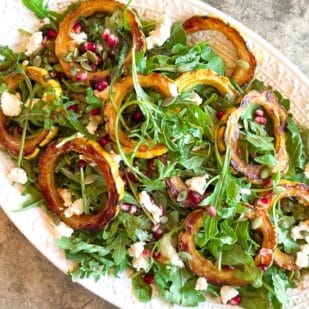
Roasted Delicata Squash & Arugula Salad with Goat Cheese and Pomegranate
Delicata squash has low FODMAP serving sizes and this Roasted Delicata Squash & Arugula Salad with Goat Cheese and Pomegranate shows it off beautifully. The tender, sweet squash (you can eat the pretty striped skin) combined with the peppery, fresh green arugula, crunchy pepitas and juicy, tangy pomegranate are complemented by the smooth, salty goat cheese. A vinaigrette brings it all together.
Ingredients:
Salad:
- 490 g of skin-on seeded, ½-inch (12mm) wide, crosswise rounds of Delicata squash, made from 2 medium Delicata squash
- 1 tablespoon extra-virgin olive oil, divided
- Kosher salt
- Freshly ground black pepper
- 5- ounces (140 g; about 5 heaping cups) arugula
- 1 cup (180 g) pomegranate seeds
- ¼ cup (30 g) toasted pepitas
- 4- ounces (115 g; about ¾ cup) crumbled goat cheese, such as Montrachet
Vinaigrette:
- ¼ cup (60 ml) Low FODMAP Balsamic Vinaigrette
- 2 teaspoons maple syrup
- Kosher salt
- Freshly ground black pepper
Preparation:
-
Roast the Squash: Position rack in upper third of oven. Preheat the oven to 425°F (220°C). Wash the squash, as you will be leaving the skin intact. Slice the squash into ½-inch (12 mm) wide rounds. Use a spoon to scoop out the seeds from each round. Weigh out 490 g of squash rounds to use for the recipe. Drizzle about half of the olive oil onto a half sheet-pan and use your fingers or a pastry brush to spread it out over the entire pan. Place the squash round in a single layer on the pan (if you have to overlap a few pieces, that’s okay). Drizzle the remaining olive oil on top, using your fingers or pastry brush to cover the cut surfaces. Season lightly with salt and pepper.
-
Bake for about 30 to 35 minutes total, or until the squash is tender and golden, flipping the pieces over halfway through roasting time. The squash can be held at room temperature for several hours at this point. Just drape some plastic wrap over it.
-
Make the Dressing and Assemble the Salad: Right before serving, whisk together the Low FODMAP Balsamic Vinaigrette with the maple syrup, and season lightly with salt and pepper.
-
Place arugula, pomegranate seeds and pepitas in a bowl and dress lightly with some of the vinaigrette, tossing together well. Arrange about half on serving platter. Dollop about half the goat cheese here and there, and place about half the squash rings on top. Drizzle with a bit more vinaigrette, concentrating on the squash. Repeat for final layer of arugula mixture, goat cheese, squash, and vinaigrette. Salad is ready to serve.
Notes:
FODMAP Information
All recipes are based upon Monash University & FODMAP Friendly science at time of initial publication.
• Arugula: Monash University has lab tested arugula. For many years they stated that arugula had no FODMAPs. After a 2019 smartphone app update, they changed the entry to say that arugula contains trace amounts, but still state, “east freely and according to appetite”. FODMAP Friendly has found no FODMAPs in arugula. Their suggested low FODMAP serving size is 37 g (about 1 cup), with a max serve of 370 g.
• Cheese: Many cheeses have low FODMAP serving sizes. The low FODMAP diet is not a dairy-free diet. Hard cheeses such as Parmigiano Reggiano or Pecorino Romano have been lab tested by Monash University and are low FODMAP in 40 g amounts.
• Delicata Squash: Monash university has lab tested Delicata squash, both peeled and unpeeled; the low FODMAP serving sizes are very similar. Unpeeled, the low FODMAP serving size is 49 g. Peeled, the low FODMAP serving size is 52 g. This is for raw in each instance.
• Maple Syrup: Both Monash University and FODMAP Friendly have lab tested maple syrup. Monash says that maple syrup is Green light and low FODMAP in servings of 2 Australian tablespoons (50 g). FODMAP Friendly gives it a “Pass” at 2 tablespoons (53 g). These amounts are recommended due to Australian healthy eating guidelines; no upper limit is posted by either Monash or FODMAP Friendly. Due to its chemical makeup, maple syrup contains more glucose than fructose and therefore can be considered free of FODMAPs. The FODMAP Friendly app does show you that no FODMAPs were detected in lab testing.
• Oil: All pure oils are fats and contain no carbohydrates, therefore they contain no FODMAPs.
• Pomegranate Seeds: More properly called pomegranate arils, they have been lab tested by Monash University and FODMAP Friendly. According to Monash, pomegranate seeds are low FODMAP in ¼ cup amounts, which weigh 45 g. FODMAP Friendly lab testing says a low FODMAP serving size is 66 g.
• Vinegar: Several vinegars have been lab tested by both Monash and FODMAP Friendly. From Monash: Apple cider vinegar is low FODMAP at 2 Australian tablespoons or 42 g; Balsamic vinegar is low FODMAP at 1 Australian tablespoons or 21 g; Malt vinegar contains no FODMAPs; Rice wine vinegar is low FODMAP at 2 Australian tablespoons or 42 g. From FODMAP Friendly: Balsamic gets a “Pass” at 2.5 tablespoons or 42 ml. Apple cider vinegar gets a “Pass” at 1 tablespoon or 14 g (don’t ask me why one is in milliliters and the other in grams).
Please always refer to the Monash University & FODMAP Friendly smartphone apps for the most up-to-date lab tested information. Foods will be retested from time to time; in the case of raw ingredients, such as fruits and vegetables, results may vary. All lab tested results are valid and represent a snapshot in time. As always, your tolerance is what counts; please eat accordingly. The ultimate goal of the low FODMAP diet is to eat as broadly as possible, without triggering symptoms, for the healthiest microbiome.